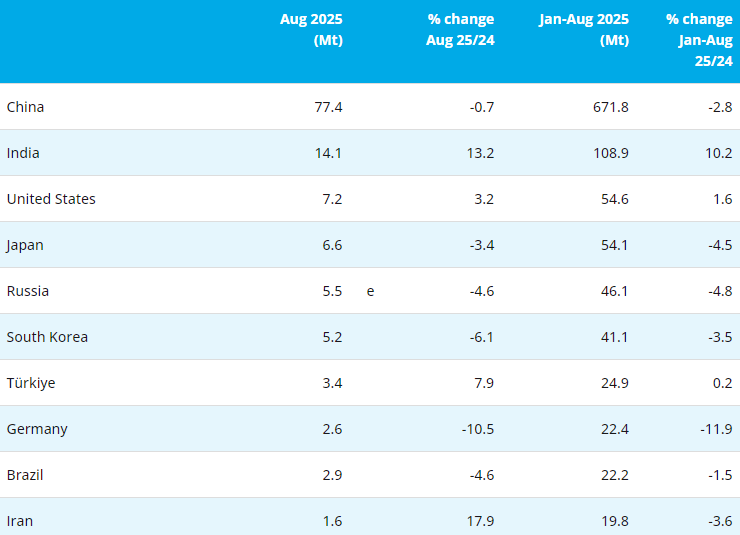The short-term outlook for steel demand is exceptionally weak, reflecting depressed capital investment, construction activity and car production in many economies, the OECD said in a statement issued Tuesday after a joint workshop with World Steel Association in Kuala Lumpur.
"The strong upturn in steel demand which began in 2002 has come to an abrupt halt," chairman of the OECD steel committee Risaburo Nezu said. He added that growth in steel demand began to weaken appreciably in August 2008, in response to slowdowns in construction activity in developed economies and China's moderating economic expansion.
"Since then, the extraordinary set of events surrounding the financial sector and the sharp deterioration in business prospects for steel-consuming industries have led to depressed steel demand conditions in all major markets," he added.
The short-term outlook for steel demand is weak, Nezu said. He attributed the causes of this weakness to soft construction activity and investment in capital equipment -- which are both highly sensitive to the availability of capital --, and lower consumer spending on durable steel-intensive goods such as automobiles and household appliances.
Regarding recent production cuts by steelmakers, the OECD statement said they had been especially pronounced in the CIS and China in recent months, where seasonally adjusted production fell by a cumulative 35% and 25% respectively in July-October 2008.
Production was down 14% in NAFTA (US, Canada and Mexico), 11% in the EU, 6% in Japan and 3% in South America during this period, with faster declines reported or expected for November and December, the OECD said. The tightening of credit and weaker prospects for demand have stalled the expansion plans of some steelmakers, the OECD said, again emphasizing the CIS region as particularly hard hit.
In China, steelmaking capacity is still expected to grow over the longer term, but in the short term, many small and outdated facilities may shut down in response to weak demand and government efforts to foster consolidation.
In India, capacity will increase by less than was previously expected, reflecting delays to many greenfield projects and weaker market conditions, the OECD said. Thus, despite sharp declines in demand, world steelmaking capacity is projected to continue to increase from 1,563 million mt in 2007 and an estimated 1,636 million mt in 2008 to 1,779 million mt in 2010.
The 2010 level has been revised down by 74 million mt, compared with projections made last spring. In its statement, the OECD also warned of the growing concern of trade frictions and trade-distorting practices caused by national policy measures recently implemented in some countries.
Copyright © 2013 Ferro-Alloys.Com. All Rights Reserved. Without permission, any unit and individual shall not copy or reprint!
- [Editor:editor]



 Save
Save Print
Print Daily News
Daily News Research
Research Magazine
Magazine Company Database
Company Database Customized Database
Customized Database Conferences
Conferences Advertisement
Advertisement Trade
Trade













Tell Us What You Think